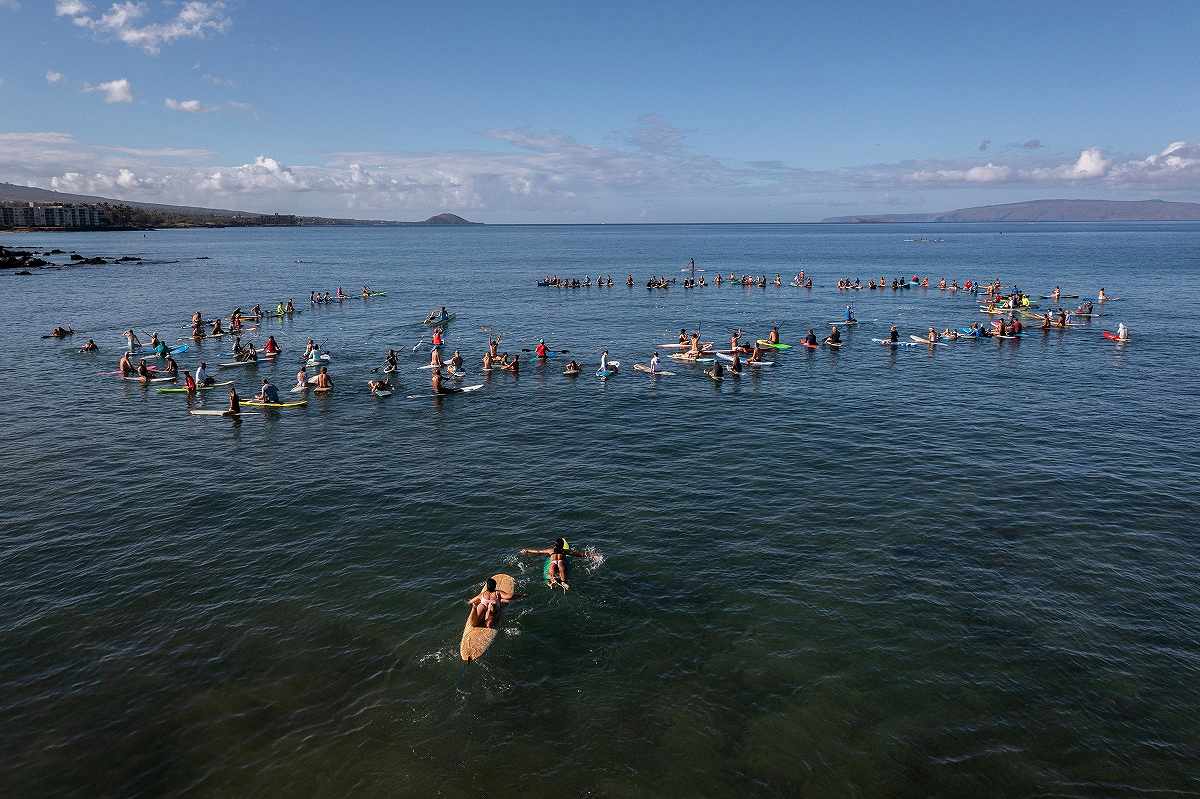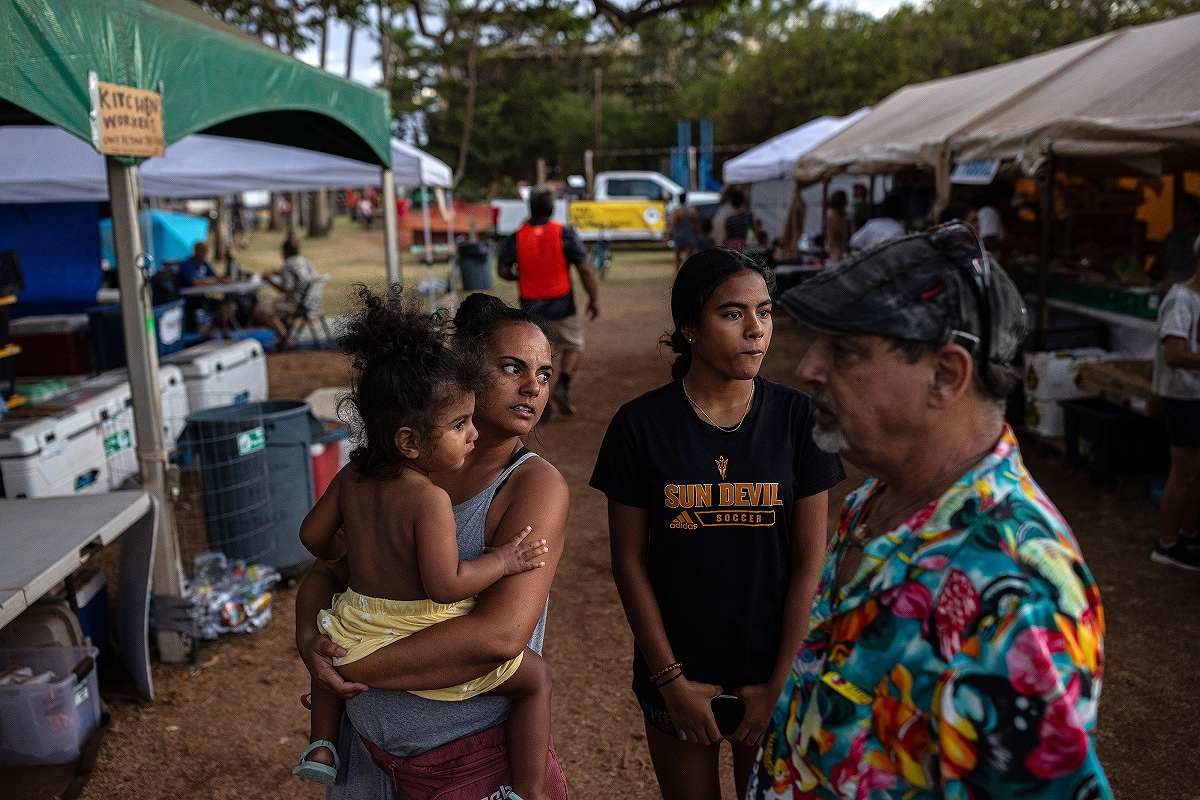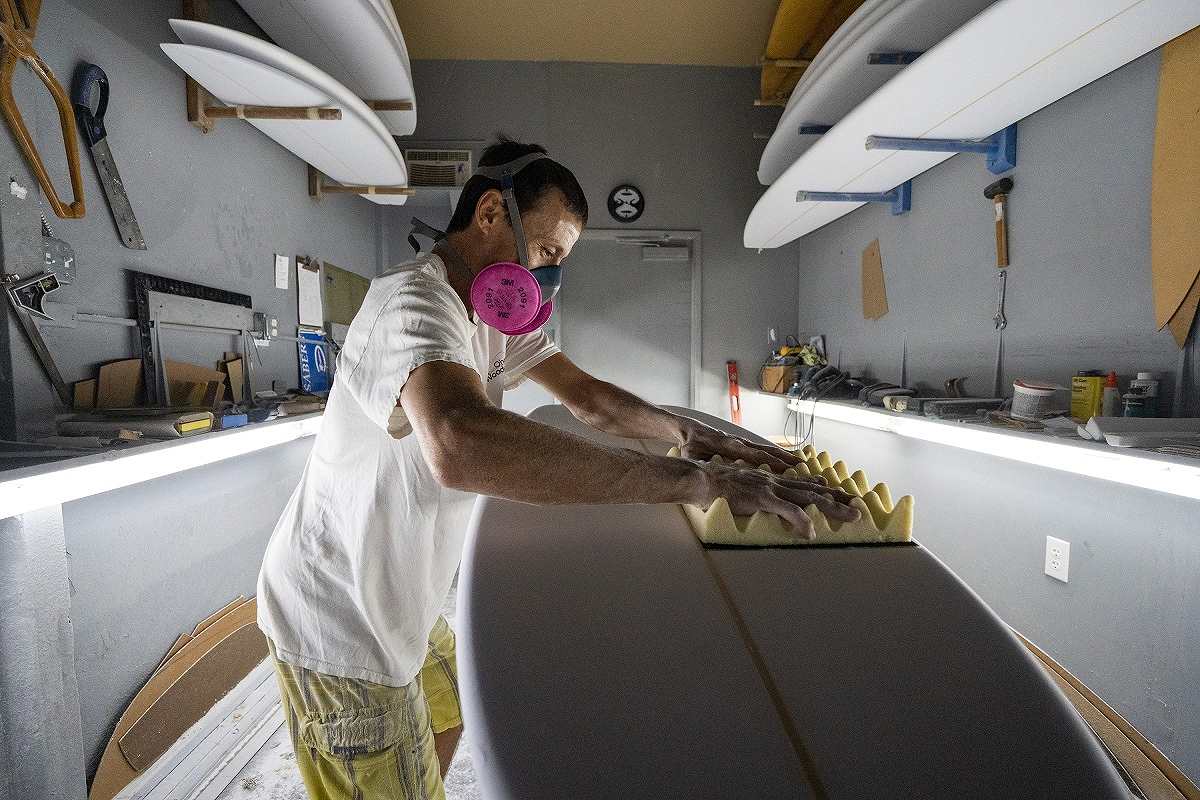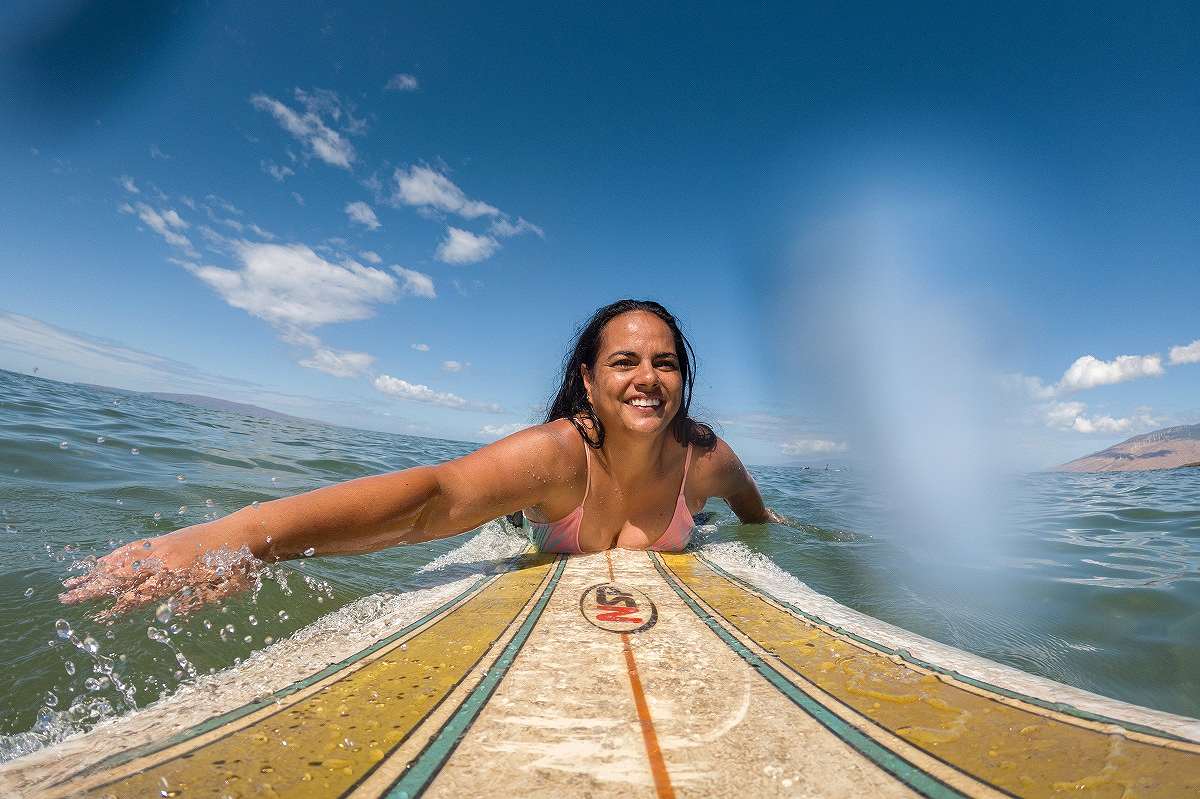
Victoria Gladden and her 14-year-old daughter Brianna swim toward a paddle-out honoring those affected by the Lahaina and Kula wildfires.
15:11 JST, September 16, 2023
LAHAINA, Hawaii – Jud Lau knew better than anyone how important it was to get back in the ocean. How you don’t think about anything else when you’re sitting on a break, waiting for the perfect wave to arrive.
That’s what so many people on Maui needed – even a brief reprieve – after the deadly Aug. 8 fire in Lahaina, he said. A week later, the former pro surfer organized a surf day for children displaced by the disaster.
“Surfing can be a great way for people to heal – ocean therapy, saltwater therapy. The ocean is a healing place,” said Lau, who shapes custom boards up in Maui’s mountains. “A lot of us here, it’s all we can think about, what has happened.”
Lau found himself unable to sleep, looking up past national tragedies, trying to understand the scope of what happened on the island where he was born and raised. He cited the death toll of Sept. 11, 2001, and the population of New York City. At least 115 people died in Lahaina, but the number of missing people was still unknown – it could be in the hundreds.
“In a community of 150,000 to 200,000 at most,” he said, tears welling in his eyes, voice breaking, “the effects, I think, are just beyond what anyone can even fathom.”
What does one do in the face of the unfathomable? The lives lost, traumatizing escapes, homes and livelihoods vanishing in an instant?
Lau didn’t know. He just knew surfing. And he knew that, for many people here, a surfboard wasn’t just a material possession. He knew of surfers who evacuated Lahaina and took only their boards. Many survivors lost theirs to the flames, he said, meaning they lost a part of themselves. As he put it: “Your surfboard is like part of your soul.”
Lau wanted to give people here a small piece of themselves back.
He began soliciting surfboard donations for Lahaina survivors through Instagram, and he and other board shapers on Maui volunteered to sculpt new customs. His Instagram inbox overflowed with messages.
One of those messages came from a mother named Victoria Gladden.
“Aloha I saw your post on surfboards being lost in Lahaina fires,” Gladden wrote to Lau. “While we lost a few I was hoping to inquire about 2 surfboards so my daughter and I can get in the water.”
She sent a photo of her and her daughter standing on Lahaina beach, grinning wide.
Lau had no idea how much she needed those boards.
– – –
Life in Lahaina, and on the waves

Gladden, whose home in Lahaina was destroyed in the Aug. 8 wildfires, visits a local relief hub to pick up supplies with her daughters Olivia and Brianna and her father, Wayne.
Gladden, 38, was born and raised in Lahaina – a west side girl, through and through.
She went to Lahainaluna High School, where Hawaiian royalty once attended, and she started surfing when she was 18, collecting boards along the way
For Gladden, who is Polynesian – she is Samoan on her mother’s side – surfing was a way to perpetuate Hawaiian culture. It dates back hundreds of years on the islands, but in the 20th century, the famed Hawaiian swimmer Duke Kahanamoku put “surfing on the map” for the modern era, Gladden said. “That was the start, because before that, anything Hawaiian was banned.”
Gladden also came to see surfing as the one thing in life that – during that moment – was just for her. “It’s just you, your board and the wave you’re going to catch. No one else is going to do it for you, except for you.”
She helped teach her daughter Brianna, 14, how to surf and similarly find peace in the ocean. But Gladden had to stay off the waves for about a year after she became pregnant and gave birth to her two other daughters, Kai, now 5, and Olivia, now 1.
“Even though you’re out where sharks are and you could get pounded in a second, when you’re past the break, it just feels safe,” Gladden explained recently while holding Olivia on her hip as Kai chanted “mommy, mommy” in a singsong voice. “Like, peaceful.”
Gladden worked part time at a popular restaurant in the resort area of Kaanapali, north of Lahaina. It overlooked the ocean, her favorite place in the world. She could never imagine living in a place where she couldn’t get in the water. “What kind of life would that be?”
She tried to share that love of the ocean with her daughters in other ways. On a recent Sunday at the Maui Ocean Center, they toured the crowded aquarium with extended family after spending the morning at church. Olivia ran through the exhibits, pointing at fish and climbing up rocks as her mother tried to keep up. Kai marveled at the reef and shark exhibits, alternatively holding her cousin’s and Brianna’s hand.
Gladden picked up Olivia to show her the jellyfish. “They may not know it, but it makes me happy to see them get excited about the ocean and something I love. It feels like I’m passing down knowledge,” she said as people squeezed by. “This is a way for me to take them in the ocean” – and, she added with a laugh, “know they’re not going to drown.”
Despite the hectic scene at the aquarium, this family day was a gift for Gladden, given the traumas of Aug. 8 and after.
Gladden evacuated with everyone who lived in her multigenerational household – her two youngest daughters, mother, grandma and two cousins – hours before fire engulfed Lahaina, and after her sister’s neighbors urged them to leave early. Recalling how her grandmother prayed for their safety every day, she burst into tears. They drove north to the hotels in Kaanapali, where much of her family works. Brianna, thankfully, was down in Kihei where she lives with her father and stepmother.
Gladden had been through wildfires before, so when she evacuated, she didn’t prepare to leave for good. She didn’t take the years’ worth of meticulously kept journals, which she wrote as guidebooks for her daughters. She didn’t take the free weights she had collected as part of her fitness journey. She didn’t take Brianna’s old baby blanket. And she didn’t take the five boards she had stored in her house, including her auntie’s stand-up paddle board, Brianna’s hand-me-down boards or her custom, 10-foot longboard she was gifted. She had named it “Big Bertha.”
Gladden just packed extra clothes for Kai and Olivia. She neglected to take some for herself.
It wasn’t until days later that Gladden drove back down the highway and saw what had happened: Her neighborhood was burned to the ground.
She was left with a mixture of deep gratitude that they could leave in such an orderly way, grief for what was gone and the survivor’s guilt so common in the wake of such disasters.
Gladden had only lived in her house for a few years. She felt like the universe had brought her the perfect place. Her landlord was committed to renting to local people in her hometown, where the cost of living is high. Her home had a yard where she could grow food, a car port, storage, space for her girls and a nearby playground for Kai, who loved playgrounds the way her mother loved the ocean. Gladden’s father lived up the road, and her extended family was all nearby.
Gladden didn’t fully grasp all that she lost immediately after the fire. She has discovered it along the way.
For example: It wasn’t until she was scrolling through Instagram one night when she saw Lau’s post about giving away surfboards to Lahaina fire survivors when she thought, “Oh crap. I had five boards.”
– – –
‘Putting mana into the board’

Lau shapes a board at his studio in Haiku. After the fires, he began soliciting surfboard donations and is sculpting custom boards for survivors.
The morning before Lahaina burned to the ground, before everyone on Maui realized how bad it was going to be, Lau was out on the north shore, surfing.
He has been doing it for 30 years. Now 53, Lau has competed professionally, began shaping boards in 2006 and has coached kids. He’s helped them perfect their technique in the same Lahaina waves that people desperately flung themselves into on Aug. 8 to escape the flames.
But since the fire, he retreated to his shaping room in Haiku, the town where he lived and worked. On a recent Friday, he shaped an exact copy of a 7-foot-1-inch-long board that belonged to a fire survivor. He wore a ventilator mask on his face as he gracefully pushed a block along the board’s edges, sanding it down. Lau then picked the board up, feeling its weight in his hands and eyeing the shape to determine its symmetry. Classical Hawaiian music – and a lot of white dust – filled the air.
“It’s almost meditative,” he said.
He and other shapers donated their labor to make boards for people who couldn’t get the right size through donations. An anonymous donor paid for the cost of the materials. In just the first several days of the Surfboard Replacement Project, they equipped fire survivors with dozens of boards. A shipment of donations from Oahu arrived just last week.
Lau threw himself into managing the project as survivors and their friends reached out for help. “I feel so thankful that there’s something that I have to offer,” he said.
But the economic impact of the fires – which led to a sharp drop in tourism – has hit hard on many of those helping. Surfboard shaper Eric Totah, who is lending a hand to build new boards, was also a surf instructor who, on Aug. 8, was supposed to be teaching a class in Lahaina. He lost his primary source of income but remained grateful he still has his waves.
“You almost get baptized every time you go out,” he said, with a smile.
That was also how Gladden’s eldest, Brianna, felt. For her, surfing was a safe place. She felt “just comfortable,” she said. “You forget about everything.”
A couple days after Gladden first messaged Lau, he drove down to Kihei to drop off not just one, but three boards for Brianna. They were shocked and moved. “I was was so happy, but I feel like I didn’t show it,” Brianna said, who had been too overwhelmed to come outside. “I was about to cry.”
She’s a teenager and will need boards that can grow with her, Lau explained. Gladden then received her new, 9-foot-6-inch longboard. She would name it “Stick.”
Donated boards may have wear and tear, but they can still serve surfers well. Custom boards are often made with the particular surfer in mind.
Lau liked to picture the recipient riding the board as he smoothed it down. “It’s putting mana into the board,” he said. A life force, an energy.
Some three weeks after the fires, Lau still hadn’t surfed. But as he walked around this board he was making for a fire survivor, he moved his feet the same way long-boarders do while riding waves.
– – –
Returning to the wreckage
After her house burned down, Gladden relocated to a vacation condo in Kihei with her two youngest daughters. It was a temporary situation through September, common among so many displaced Lahaina families.
Soon after moving in, she tried to keep Kai from going on the balcony, reading aloud the sign on the door about how the screen door was broken and “to avoid further damage.”
“This is not our house,” she told Kai, “and I don’t want to further damage this place.”
As a single mother, Gladden had so many questions to navigate: What should she do about day care for Olivia? Will she have to find a new job if the restaurant doesn’t open back up soon? How will she make time to take Kai to the playground?
But she still hadn’t seen what remained of her old house. A few weeks after the fire, Gladden drove her three daughters from Kihei to West Maui to visit their extended family, who were all staying at a hotel in Kaanapali.
“Oh I know that kid!” Brianna said as they drove by someone on the side of the road. Then they passed their old neighborhood. From the highway they could see the scorched remnants of trees and cars and the crumbling, blackened and gray walls that were once people’s homes.
“The playground’s not fine,” Kai said from the back seat. “Everything looks bad.”
“Not everything. Look, the church looks nice,” Gladden reassured her.
“The grass got burned a little bit,” Brianna added.
“And the gas station looks nice. So not everything looks bad,” Gladden said. “But, a lot of things.”
“Yeah,” Kai agreed
As they drove, Gladden’s sister called to say that sirens were blaring – another fire. Some 10 minutes later, Brianna’s phone finally buzzed with the alert. She read it out loud: “‘Evacuation order.’ Mommy, evacuate.”
“Where, please?”
Brianna read the street names and then “evacuate your families and pets now. Do not delay.”
It was a neighborhood far from the hotels. Their family decided to go to a meeting point, so they could all be together. Gladden reunited with them and other displaced, rattled residents in the hotel lobby, when they heard the fire department had contained the fire and they didn’t need to evacuate. “That’s what you said last time,” someone in the lobby said under her breath.
Videos on social media showed a helicopter dropping water on the hot spot up the hill. The fire was subdued, but Gladden and the girls ditched their plans about staying overnight here and headed back to Kihei.
On the drive back, Gladden wanted to try to see her house – people had been let back in in recent days. It was just three houses down from where National Guard members stood watch.
Gladden had heard a story about a preserved Bible in the wreckage. She wondered whether anything would be left at her house, even if it was just the ashes of her previous life. But the brushfire from before left the National Guard members spooked. They didn’t let her through; she needed to be on a list, they said.
She tried again the next day, on the way to take the girls to see their grandpa. She parked on the side of the street while her daughters waited in the car. “Who’s coming here? Is that a dump truck?” asked Kai after a big green vehicle parked and let out more National Guard members. “Is that a bus? it looks like a bus.”
Gladden returned. They still wouldn’t let her in. They were running a protocol, they told her.
She sat in the driver’s seat and wondered aloud: Maybe there was some message in this, about not taking the children. But it was their experience, their house, too.
Gladden drove away. She was supposed to start her new semester at college the next day, where she was studying nutrition. Now she worried about losing her financial aid if she didn’t go back to school.
“These are just challenges that all kinds of people go through,” she said. “But why all at one time?”
She parked the car and began to cry. She felt deep gratitude that she had her children. But there were still parts of life that had felt like they were hers, and the universe that gave her so much had now taken so much. “Took my town. Took my school . . . everything I care about.”
“And I think that’s what surfing is,” she said, through tears. “When I realized my boards were gone, like, another thing taken away from me? What else are they going to do?”
She wept at the steering wheel until her father showed up.
– – –
Going home

Gladden paddles in the water a few weeks after the fires destroyed her home and the five boards she kept there.
Gladden and Brianna took out their new boards, stored at the house of Brianna’s father and stepmother, who has been helping Gladden navigate the post-fire chaos.
They were there for a community paddle-out in honor of Lahaina. It was their first time back in the water since the disaster.
Gladden discovered that a piece of wood in the yard had punctured her new yellow longboard. “A little hiccup, but that’s not going to stop us,” she said with a smile. She patched the hole with a sticker and electrical tape.
“I feel confident,” Brianna said, sleep still wearing off as she carried her new bright green board.
When the pair arrived at the cove in Kihei, southeast of Lahaina, they carried the boards to the ocean and threw themselves in.
Gladden came back up for air, water running over her long, black hair, her face breaking into a smile. It was like what Totah said, about how each time getting back in for a surf is like a baptism.
Mother and daughter paddled out to a circle of about hundred people already sitting on their boards. A man let out a cry and everyone – including Gladden and Brianna – splashed water in honor of Lahaina.
The pair would spend the morning trading boards, cheering each other on, sharing waves. “Paddle to the right!” Gladden instructed Brianna, who was riding her mother’s longboard through the crowded break.
But before Gladden showed her daughter how to navigate this new surf spot, Gladden had to christen her new board with her first wave back.
It happened while all the surfers were still in the paddle-out circle. A long silence took hold, and it felt like the ceremony was over, so Gladden turned around and paddled away from the group.
The midmorning sun shone on her as she lay prone on her board, her arms slicing the clear, greenish-blue waters.
A man behind her in the circle started a chant in Hawaiian, as the water swelled beneath Gladden.
She paddled with force to stay ahead of the wave forming behind her. Then, she caught it.
Gladden stopped paddling and took to her feet.
She found her legs beneath her, standing with the kind of ease it took years of surfing in Lahaina to achieve. Her hair ran down her back as the wave carried her, moving the board forward the way only the ocean can. She looked ahead.
Gladden wasn’t thinking about where she and her daughters would live next month. Or when she could replace the cellphone she smashed in the car door as she was putting the stroller away. Or the mixture of grief and gratitude the fire left her with. Or how the refrigerator in the vacation rental where they were living wasn’t keeping Olivia’s milk cold enough. Or whether she would have a job in two weeks.
All of that was waiting for her on the shore.
For now, in this moment, she was just on her board, riding a wave.
Top Articles in News Services
-

Survey Shows False Election Info Perceived as True
-

Hong Kong Ex-Publisher Jimmy Lai’s Sentence Raises International Outcry as China Defends It
-

Japan’s Nikkei Stock Average Touches 58,000 as Yen, Jgbs Rally on Election Fallout (UPDATE 1)
-

Japan’s Nikkei Stock Average Falls as US-Iran Tensions Unsettle Investors (UPDATE 1)
-

Trump Names Former Federal Reserve Governor Warsh as the Next Fed Chair, Replacing Powell
JN ACCESS RANKING
-

Producer Behind Pop Group XG Arrested for Cocaine Possession
-

Japan PM Takaichi’s Cabinet Resigns en Masse
-

Man Infected with Measles Reportedly Dined at Restaurant in Tokyo Station
-

Israeli Ambassador to Japan Speaks about Japan’s Role in the Reconstruction of Gaza
-

Videos Plagiarized, Reposted with False Subtitles Claiming ‘Ryukyu Belongs to China’; Anti-China False Information Also Posted in Japan























